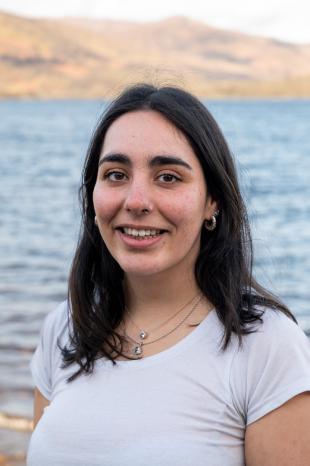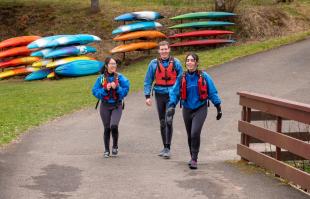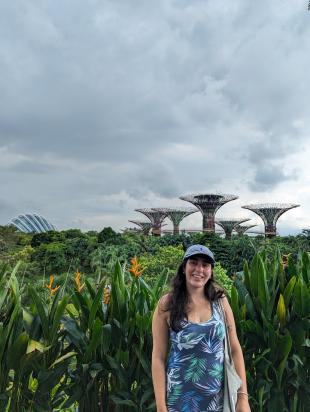About Ailsa
After graduating, Ailsa had planned to take a year out to go travelling, but the COVID pandemic put an end to those plans. Instead, she spent the year working in a distillery alongside a group of engineers who were commissioning an anaerobic digestor. It was this, combined with her passion for mitigating climate change, and her experience on a final year undergraduate project on solar cells, that developed her interest in the renewables sector.
Ailsa is a Chemistry graduate from the Isle of Arran. She obtained her first degree from the University of Glasgow and applied to IDCORE as she wanted to use her science-based background in order to help accelerate renewables in line with Net Zero ambitions. She wasn’t sure whether she wanted to do a PhD or to continue working in industry. IDCORE allowed her to do both, plus the training in the first year helped her to convert from Chemistry to Engineering without the need to take a Masters.
Ailsa also volunteers with a sustainability charity whose target audience is 18-30 year olds with little knowledge of climate change issues. She previously helped run a programme of 6 modules for the charity, organising events, securing speakers, and supporting action from the participants. She is currently involved in a strategic review of the organisation’s aims and delivery approach.
Working at FloWave
Ailsa’s project is exploring how to extend the tank testing capability at FloWave to incorporate floating offshore wind, seeking to understand how the structural properties of the platform and tower should be scaled and modelled for effective testing. The project is currently focused on the application of hydrodynamic loads and the impact this has on nacelle accelerations. This links to the work of Anita Nunes Leite from the 2020 cohort who is looking at wind interactions. Ailsa is also going to be looking at other nacelle interactions, and ultimately her thesis will be made up of multiple areas of study rather than answering just one research question.
Ailsa spends around 3 days a week at the FloWave facility, which is a supportive environment to work in. Everyone ‘mucks in’ to keep the facility operating, and she enjoys helping out with instrumentation calibration and supporting test programmes going through the facility. There is flexibility in the IDCORE agreement, which allows IDCORE researchers to spend up to six hours per week working on other projects for their project sponsors, creating real opportunities to learn more about the sector.
Tank testing is a skilled activity and initially relies on the support of others, but Ailsa is looking forward to being able to work independently in the curve tank. Her project is progressing well and she has already presented at a conference. She will soon be able to start collecting data from the physical model she is constructing. Delivering these results and presenting them at conferences will help to build the reputation of FloWave as a unique and versatile facility.
The IDCORE Community
There is a risk of undertaking a PhD becoming a lonely experience, but that’s not an accusation you could make of being an IDCORE research engineer. The twelve people in Ailsa’s cohort have become good friends and this has been one of the most positive aspects of being part of IDCORE. It helped with settling into Edinburgh in the first year, creating a ready-made network, and continues to provide important mutual support now that everyone is with their sponsoring companies, through a monthly on-line chat session and other ad-hoc engagements.
As part of her work, Ailsa has had to become well versed in the use of Open Fast, an open-source numerical code developed by NREL in the US. Others in her cohort are also using this code and Ailsa has been able to assist them as they have hit problems with it. Similarly, she has benefitted from being able to draw on their knowledge and experience of other areas relevant to her work.









